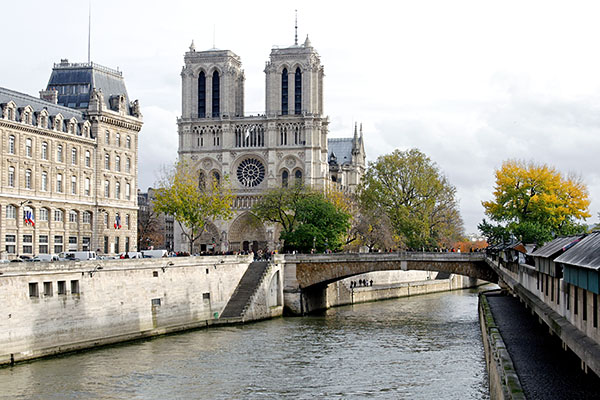
Notre Dame and the Seine
Click on any image to see a larger (1500 x 1000 pixel) version!
In November 2008, after having been away from the capital for much too long, we decided to spend a weekend in Paris. The weather forecast was grim: three days of rain were predicted. As it turned out, the only time it rained at all was during the night; the rest of the time, we had grey skies at worst, and on occasion, the sun even made appearances.
On Saturday morning, we took the metro to La Défense, the business district west of Paris. In addition to various skyscrapers, there are several noteworthy structures, such as the CNIT (Centre de Nouvelles Industries et Technologies) with its sloping concrete roof [1], and the Grande Arche [2] commissioned by François Mitterand and built in the 1980s at the end of the historical axis that runs east to west from the Tuileries gardens to the obelisk at the Place de la Concorde, down the Champs Elysées, through the Arc de Triomphe all the way to La Défense.. Several works of art are displayed throughout the area; for instance, the 65 tons of steel of Alexander Calder's "Red Spider" dwarf the huge two-story merry-go-round [3], In front of the Grande Arche, wooden huts had been set up in preparation for a Christmas market to be held in December [4]. As we made our way east, we passed the beautiful Agam fountain [5], built by Israeli artist Yaacov Agam in 1988. It measures 57 by 26 meters (187 by 85 feet), and the pieces of enamel that form a mosaic of 86 different colors were made in Venice especially for this work.
We continued eastwards on the historical axis, walking through Neuilly-sur-Seine along the Avenue Charles de Gaulle with its many beautiful facades [6] and clean and uncluttered yards [7]. One thing we don't get enough of where we live is the colorful display trees put on in the fall as the leaves change to a rich yellow, fiery red, or every shade in between. In Paris, the changing of the seasons is much more pronounced as evidenced by this gorgeous example [8]. After passing the Porte Maillot, we followed the Avenue de la Grande Armée, approaching the Arc de Triomphe from the west [9].
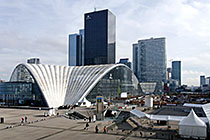
|
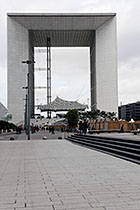
|
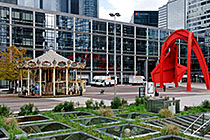
|
La Défense business district |
La Grande Arche |
Calder's 'Red Spider' |
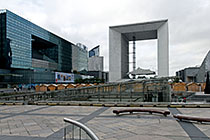
|
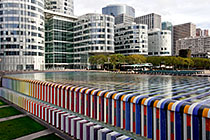
|
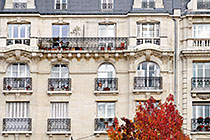
|
Elysée La Défense and the Arche |
The Agam Fountain |
Facade in Neuilly |
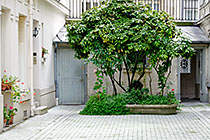
|
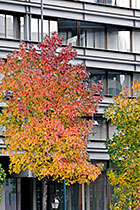
|
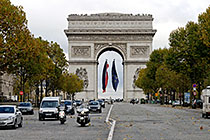
|
Neuilly backyard |
Fall colors |
On the Avenue de la Grande Armée |
From the Arc de Triomphe [10], we walked down the beautiful Avenue Victor Hugo with its canopy of trees and wrought iron terrace bannisters [11], taking care to admire the goodies in the windows of Lenôtre as we passed the shop. From the Place Victor Hugo, we took the Avenue Raymond Poincaré with its stately apartment buildings [12] and followed it south to the Trocadéro from where one has a spectacular view on the Champ de Mars, and, in the background, the Ecole Militaire, all between the 'legs' of the Eiffel Tower [13]. Needless to say, being there, we couldn't resist taking a picture of the whole tower, surely one of the world's most famous landmarks [14]. We then walked back to the Arc de Triomphe on the Place Charles de Gaulle for a look eastward down the Champs Elysées [15]. We continued down the Avenue de Friedland and the Boulevard Haussmann past the lovely Church of Saint Augustine [16]. Further east, the Boulevard Haussmann enters one of Paris' main shopping areas [17] with the famous Printemps and Galeries Lafayette department stores. By now we had been walking for several hours, so we made our way to the Opera [18] from where we took the subway back to our hotel at the Place d'Italie.
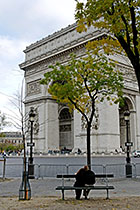
|
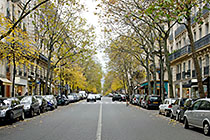
|
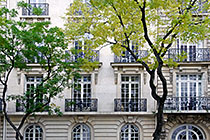
|
The Arc de Triomphe |
Avenue Victor Hugo |
Avenue Raymond Poincaré |
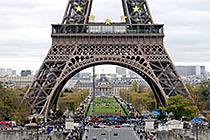
|
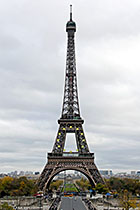
|
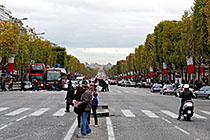
|
The Champs de Mars... |
...and the Eiffel Tower |
The Champs Elysées |
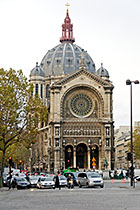
|
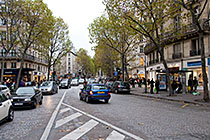
|
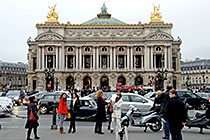
|
Church of Saint Augustine |
Boulevard Haussmann |
The Opera |
The next day, we began our sightseeing by the Canal Saint Martin [19]. This artificial waterway shortcuts a large loop in the Seine. Today, it is used mostly for recreation; following the canal makes for a lovely walk [20]. The canal is rather narrow but does widen considerably in certain parts [21]. There are many bridges that cross the waterway; here, near the Rue Dieu, there is a typically tall pedestrian overpath as well as a moving bridge that allows automobile traffic [22]. There are several locks; this one is by the Square Jules Ferry where the canal emerges from its tunnel [23]. By the Rue des Récollets we took a last look at the canal [24] before walking the two or three blocks to the Gare de l'Est where we took the metro to the Ile de la Cité.
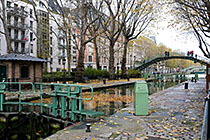
|
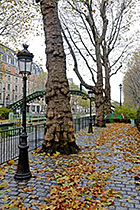
|
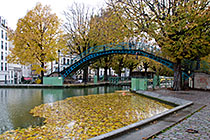
|
Canal Saint Martin |
Along the canal |
Floating leaves |
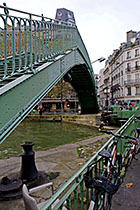
|
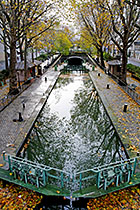
|
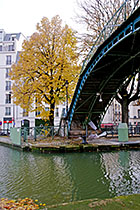
|
By the Rue Dieu |
One of several locks |
Canal bridge |
We emerged from the Cité subway station and walked the very short distance to the Parvis Notre Dame from where we had our first glimpse of the magnificent cathedral [25]. We crossed the Seine on the Petit Pont, looked back at Notre Dame one more time [26], and entered the maze of streets of the Left Bank. If one stays away from the main boulevards, one can see picturesque little alleyways like the Rue de la Parcheminerie [27]. We crossed over to the Boulevard Saint-Michel and stopped at the Place de la Sorbonne to admire the statue by Italian sculptor Rabarama [28]. The artist's real name is Paola Epifani; she has several statues on display in the Quartier Latin until the end of November, 2008. Our next destination was the Jardin du Luxembourg, a lovely park of some 56 acres and a popular weekend destination for Parisians [29]. In addition to many works of art that are in the Luxemburg Garden permanently, the park also features temporary exhibits, such as Le Prophète, a 12-ton bronze sculpture by Louis Derbré [30]. Startling, to say the least! The octagonal Grand Bassin is a favorite spot for people with model ships [31], and the surrounding lawns and flower beds are impeccably maintained, though trying to keep up with the falling leaves is apparently an exercise in futility [32]. The Palais du Luxembourg, located in the park, is the home of the French Senate [33]
.
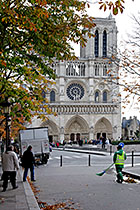
|
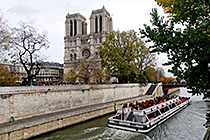
|
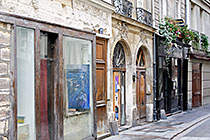
|
Street sweeper |
Notre Dame de Paris |
Rue de la Parcheminerie |
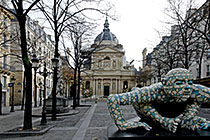
|
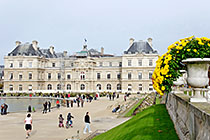
|
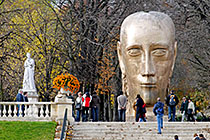
|
Place de la Sorbonne |
Palais du Luxembourg |
Louis Derbré's Le Prophète |
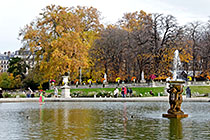
|
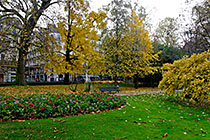
|
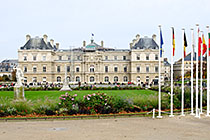
|
The Grand bassin |
The Jardin du Luxembourg |
The palace houses the French Senate |
Upon exiting the park, we walked up the Avenue Soufflot to the Panthéon [34]. This time, we didn't go inside, but we did spend a few moments among the giant Corinthian columns [35]. On our way back, we spotted three more Rabarama sculptures, one on each side of the Rue Soufflot and one in front of the Panthéon [36]. Later, we strolled along the left bank of the Seine which afforded us a wonderful view of Notre Dame [37] adorned with trees that looked as if they were on fire [38]. One last look at the Seine from the Pont Marie [39] and all too soon, it was time to make our way to the airport for our flight home.
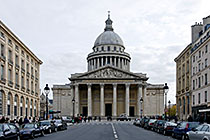
|
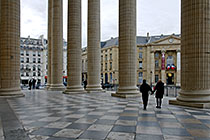
|
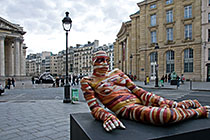
|
The Panthéon |
Among the Panthéon columns |
Rabarama statue |
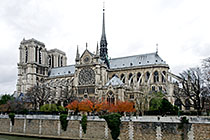
|
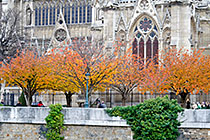
|
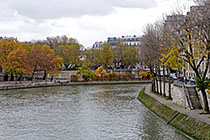
|
Notre Dame from the Left Bank |
Fall colors |
The Seine from the Pont Marie |
Paris is less than an hour and a half away from Nice by plane, and low cost carriers like easyJet make it possible to fly up for a day or two cost effectively. One thing seems clear: it won't take us long to return to what has to be the most beautiful of Europe's capital cities.
Home | Site Info | Family | The Area | Trips | France | Work | Rants | Photography | Odds & Ends
This page was last modified on November 14, 2008
Send feedback about this page to feedback@kiechle.com
https://www.kiechle.com/trips/paris08/index.htm
All contents © 1999-2026 The Kiechles